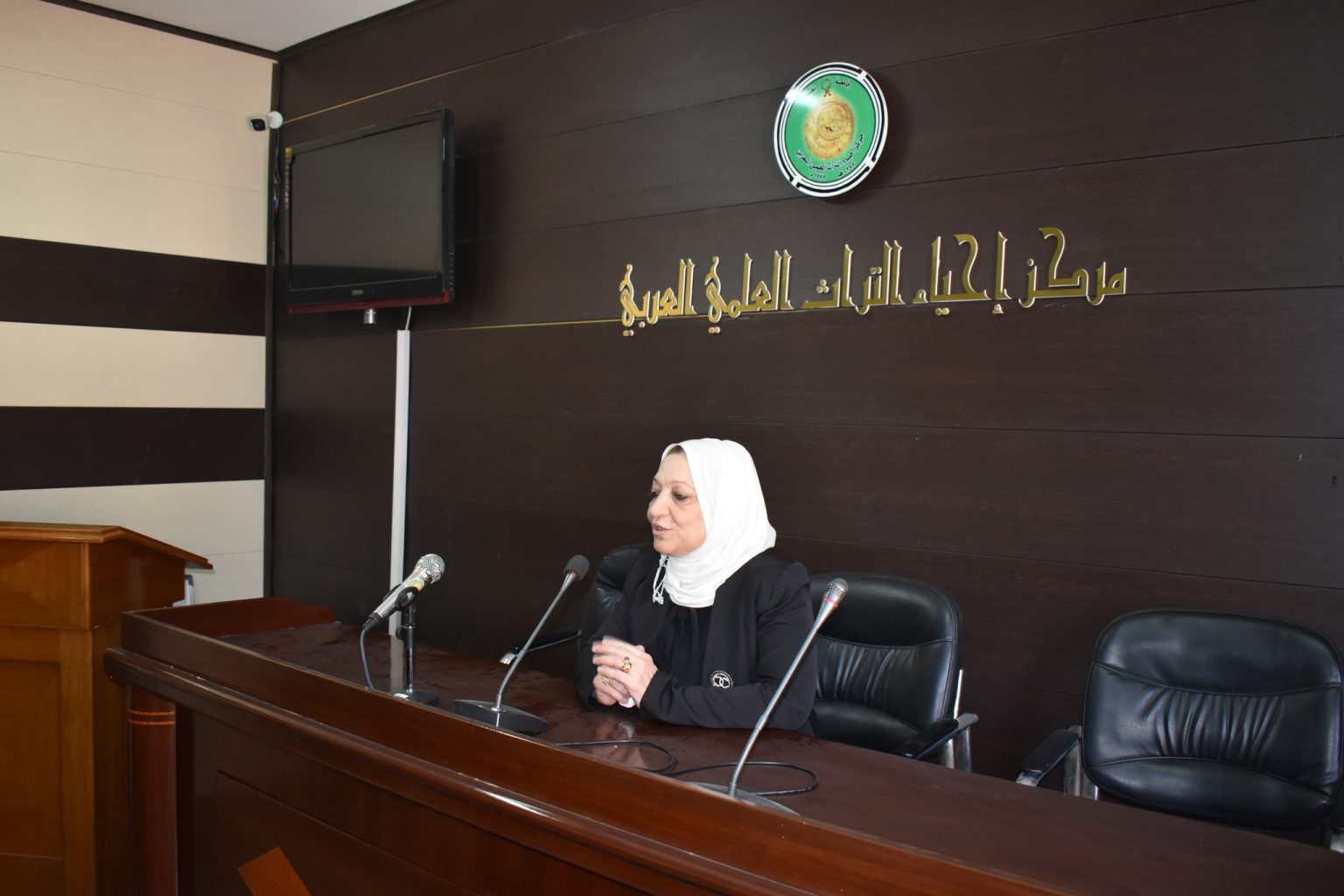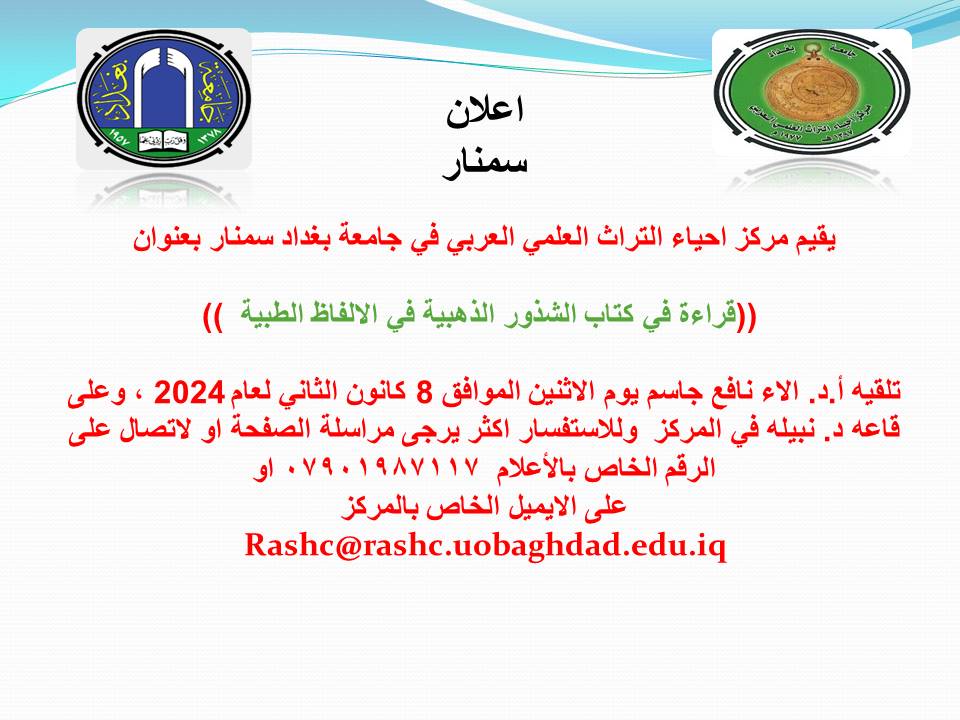سمنار ( قراءة في كتاب الشذور الذهبية في الالفاظ الطبية ) a reading of the book “Golden Roots in Medical Terminology”)محاضرة Keywords: سمنار
by
قاعه د. نبيله داود في المركز
مركز احياء التراث العلمي العربي
نظم مركز احياء التراث العلمي العربي في جامعة بغداد صباح يوم الاثنين الموافق 2024/1/8 وعلىن قاعة الاستاذة نبيلة عبد المنعم في مركزنا سمنار بعنوان قراءة في كتاب ( الشذور الذهبية في الألفاظ الطبية )) محمد بن عمر التونسي (1204هـ / 1789م ـ 1274هـ / 1857م) تحقيق / د. محمود مهدي بدوي / مركز تحقيق التراث بجامعة بجامعة مصر للعلوم والتكنولوجيا إشراف / أ.د. أنس عطية الفقي القى السمنار الاستاذ الدكتورة الاء نافع جاسم مديرة المركز متحدثة تم تسليط الضوء على هذا الكتاب لأنهُ فاز بمسابقة الكتاب التراثي لعام 2023م من قبل وزارة الثقافة في بغداد وهذا الكتاب صادر عن مركز تحقيق التراث العربي بجامعة مصر للعلوم والتكنولوجيا .كتاب الشذور الذهبية وهي موسوعة تُعد من أهم وأشمل المعاجم الطبية التراثية ، لأنها حلقة وصل بين الطب القديم والطب الحديث . فهو معجم علمي مختص يُعنى بالمصطلحات العلمية التي يتعلق أكثرها بالعلوم التجريبية الحديثة كمصطلحات ( الطب البشري والبيطري والصيدلة والكيمياء والطبيعة والهندسة والفلك ) وما له من العلوم علاقة بالطب كالنبات والحيوان والمعدن والآلآت والأدوات المستخدمة في تشخيص الامراض وعلاجها والجراحة وغجراء التجارب الكيميائية وأجهزة القياس المختلفة المتعلقة بعلم الطبيعة وكذلك حوى مفردات لغوية ذات علاقة بالطب أو العلاج أو أعضاء البدن وتتضمن أسماء بعض البلدان الأوربية التي بها مواد طبيعية علاجية وبعض الأعلام المشاهير من الأطباء القدامى وغير ذلك .يذكر الدكتور أنس الفقي بمقدمة الكتاب قام بتأليف هذا المعجم فريق من الأطباء واللغويين العرب في عهد ( محمد علي ) حملوا على عاتقهم مسؤولية إحياء العلوم الطبية الحديثة التي كانت أوربا قد بلغت فيها شأناً عظيماً بعد ما أستفادت من علماء المسلمين في العصور الوسطى ودرست مؤلفاتهم وإنجازاتهم الطبية وخير دليل على ذلك كتاب ( القانون ) في الطب لأبن سينا ظل يُدرس في جامعات أوروبا حتى أوائل القرن الثامن عشر . أبتعث الوالي محمد علي باشا مجموعة من الأطباء المصريين إلى فرنسا لتعلم الطب تحت أشراف الدكتور كلوت بك عام 1832م وعند عودة هؤلاء الأطباء من البعثة في عام 1838م وبعد تحقيقهم نجاحاً باهراً في دراستهم للطب ، قاموا بناءً على تكليف سامٍ بترجمة القاموس الطبي الفرنسي لمؤلفهِ ( فابر) إلى اللغة العربية للأستفادة منهُ في التدريس لطلبة مدرسة الطب في مصر لأن المدرسة الطبية التي أنشأها محمد علي باشا كان التعليم فيها باللغة الفرنسية لذا كان الدارسون بحاجة لمعجم علمي حديث يجمع مصطلحات علم الطب فألف كتاب ( الشذور الذهبية ) الذي شمل على خمسة أجزاء .
The Center for the Revival of Arab Scientific Heritage at the University of Baghdad organized a seminar on Monday morning, 1/8/2024, in the hall of Professor Nabila Abdel Moneim in our center. A reading of the book (Golden Roots in Medical Terms). Muhammad bin Omar Al-Tunisi (1204 AH / 1789 AD – 1274 AH / 1857 AD) Investigation / Dr. Mahmoud Mahdi Badawi/Heritage Investigation Center at Misr University for Science and Technology Supervision / Prof. Dr. Anas Attia Al-Fiqi, the seminar was delivered by Professor Dr. Alaa Nafi Jassim, Director of the Center, as a speaker. This book was highlighted because it won the Heritage Book Competition for the year 2023 by the Ministry of Culture in Baghdad, and this book was issued by the Center for Arab Heritage Investigation at the Misr University of Science and Technology. The Book of Golden Fragments is an encyclopedia that is considered one of the most important and comprehensive traditional medical dictionaries, because it is a link between ancient medicine and modern medicine . It is a specialized scientific dictionary that deals with scientific terms, most of which relate to modern experimental sciences, such as terms (human and veterinary medicine, pharmacy, chemistry, nature, engineering, and astronomy), and other sciences related to medicine, such as plants, animals, minerals, machines, and tools used in diagnosing and treating diseases, surgery, and performing chemical experiments and measuring devices. Various items related to natural science, as well as linguistic vocabulary related to medicine, treatment, or body organs. It includes the names of some European countries that have therapeutic natural materials, some famous ancient doctors, and so on. Dr. Anas Al-Fiqi mentions in the introduction to the book: This dictionary was written by a team of Arab doctors and linguists during the era of Muhammad Ali, who took upon themselves the responsibility of reviving modern medical sciences, in which Europe had achieved great importance after it had benefited from Muslim scholars in the Middle Ages and studied Their medical writings and achievements, and the best evidence of this is the book “The Law” on Medicine by Ibn Sina, which was taught in European universities until the early eighteenth century. The governor, Muhammad Ali Pasha, sent a group of Egyptian doctors to France to learn medicine under the supervision of Dr. Clot Bey in 1832 AD. Upon the return of these doctors from the mission in 1838 AD, and after achieving remarkable success in their study of medicine, they, based on a high commission, translated the French medical dictionary by its author. (Faber) to the Arabic language to benefit from it in teaching students of the medical school in Egypt, because the medical school established by Muhammad Ali Pasha was taught in the French language, so the students needed a modern scientific dictionary that collected medical science terminology, so he wrote the book (Golden Scents), which included In five parts… The book’s investigator, Dr. Mahmoud Mahdi Al-Badawi, said that the book “The Golden Fragments” was attributed to Muhammad Al-Tunisi because he collected the most of its materials and put forth the greatest effort in arranging, correcting, editing, copying, and interviewing


سمنار


